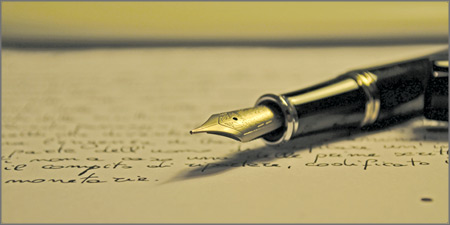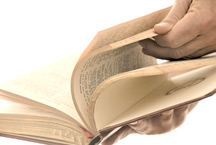|

September 8 is International Literacy Day:
Celebrating the Written Word
Aditha DISSANAYAKE
In case you are not already deeply excited over it, coming Saturday
is International Literacy Day. Yes, the majority of us (quite
legitimately too) feel we can do without these ‘days’ (why should
romantic love be celebrated only on February 14th?), but next Saturday
surely is not a day for cynicism.
 |
|
Power of
the word |
Here is why a) we should all support a drive for worldwide literacy
b) as the day falls on Saturday we have the time to do something about
it i.e take a child to a bookstore and introduce him or her to the
delights of reading c) this is the day we can have some fun asking those
around us what their favorite word is. After all, this is the day for
celebrating the written word. Is it “carminative”, “crepuscular”,
“phantasmagoria”, “frangipani”? If you are like those whom I happen to
ask the question from, I know you will say no, none of these. You will
think for a brief second and say “love” or “peace” is your favorite
word. Am I right?
To move onto more serious issues, if you read these first two
paragraphs, congratulations! You are one of nearly four billion literate
people in the world. You are lucky, because, according to UNESCO one in
five adults in the world is not literate. Say that again? Yes, 774
million adults worldwide are illiterate.
What exactly is literacy? According to Kofi Annan it is the bridge
from misery to hope. “It is a bulwark against poverty, and a building
block of development, an essential complement to investments in roads,
dams, clinics and factories. Literacy is a platform for democratization,
and a vehicle for the promotion of cultural and national
identity...literacy is, along with education in general, a basic human
right.... Literacy is, finally, the road to human progress and the means
through which every man, woman and child can realize his or her full
potential.”
Thus today, the intensity and speed of globalization compounds the
urgency of addressing the issue of literacy for all, especially among
the poor and marginalized on as many fronts as possible. Sociologists
feel members of minority groups, without pen, paper, or literature in
print in their own language, or literacy in any other language, are
marginalized and certainly on the downside of the so-called digital
divide.
Improving the literacy rate of a nation, then, does not simply mean
developing the ability of its citizens to read and write. As Paulo
Freire wrote in his book, “Pedagogy of the Oppressed” in the mid 1970s,
literacy, is an “active phenomenon, deeply linked to personal and
cultural identity. Its power lies not in a received ability to read and
write, but rather in an individual’s capacity to put those skills to
work in shaping the course of his or her own life.”
In other words, the term literacy should be at once practical and
all-encompassing. It should refer to the ability to manipulate any set
of codes and conventions-whether it is the words of a language, the
symbols in a mathematical system, or images posted to the Internet, to
live healthy and productive lives. Thus, genuine literacy involves to
quote Freire “reading the word and the world.”

“To acquire
literacy is more than to psychologically and mechanically dominate
reading and writing techniques. It is to dominate those techniques in
terms of consciousness; to understand what one reads and to write what
one understands: it is to communicate graphically. Acquiring literacy
does not involve memorizing sentences, words or syllables--lifeless
objects unconnected to an existential universe--but rather an attitude
of creation and re-creation, a self-transformation producing a stance of
intervention in one’s context.”
Paulo Freire,
“Education for Critical Consciousness”
“Education
brings sustainability to all the development goals, and literacy is the
foundation of all learning. It provides individuals with the skills to
understand the world and shape it, to participate in democratic
processes and have a voice, and also to strengthen their cultural
identity. “
Irina Bokova,
UNESCO Director General
|
Enter the term, Functional Literacy. According to David Barton, in
“Literacy: An Introduction to the Ecology of Written Language”, while
the notion of basic literacy is used for the initial learning of reading
and writing which adults who have never been to school need to go
through, the “term functional literacy is kept for the level of reading
and writing which adults are thought to need in modern complex society.
Use of the term underlines the idea that although people may have basic
levels of literacy, they need a different level to operate in their
day-to-day lives.”
 Elaborating further, the editors of “Literacy: An International
Handbook” in the introductory essay comment, “the increased use of the
term literacy stands in for expertise in such areas as computer
literacy, geographical literacy, statistical literacy—a veritable host
of literacies.” They note that the plural form of the term is used to
describe not only these multiple areas of expertise, but also to point
out that all definitions of literacy are, to some extent, a function of
culture. Elaborating further, the editors of “Literacy: An International
Handbook” in the introductory essay comment, “the increased use of the
term literacy stands in for expertise in such areas as computer
literacy, geographical literacy, statistical literacy—a veritable host
of literacies.” They note that the plural form of the term is used to
describe not only these multiple areas of expertise, but also to point
out that all definitions of literacy are, to some extent, a function of
culture.
Recognizing literacy as a human right, a tool of personal empowerment
and a means for social and human development for over 40 years now,
UNESCO has been celebrating International Literacy Day on September 8.
The theme of International Literacy Day 2012 is Literacy and Peace.
The UN explains the connection between the two concepts thus: “Literacy
contributes to peace as it brings people closer to attaining individual
freedoms and better understanding the world, as well as preventing or
resolving conflict. The connection between literacy and peace can be
seen by the fact that in unstable democracies or in conflict-affected
countries it is harder to establish or sustain a literate environment.”
The importance of literacy is obvious. Everywhere you look, you see
words – on signboards, on buses, in books, in this article. Those who
cannot read risk becoming isolated from society. Let’s help them. Let’s
celebrate literacy on Saturday, and continue the celebrations all year
long.
May that candle in the dark, never burn out.
[email protected]
|





